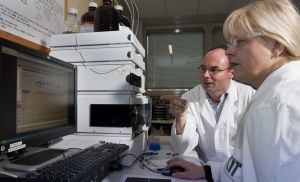Usually, chemical compounds and active substances developed under a research project are disposed of in the end, although they are of high scientific value and might be further used. In the next three years, KIT will establish the “Compounds Platform” (ComPlat), a central archive to collect such substances and to make them available to scientists worldwide. This new infrastructural facility for research has now been approved of for funding as a core facility by DFG.
“We want to prevent the substances that have been produced with much time, know-how, and effort from being lost for science and plan to make them available for further use in research,” the Head of the Institute of Organic Chemistry (IOC), Professor Stefan Bräse, says. Contrary to already existing international “Compound Storage Facilities”, the platform in Karlsruhe is planned to archive not only so-called lead molecules that are interesting candidates for the development of active substances in pharmaceutical research. The platform rather is to archive, list, and make available all stable compounds to research groups working in the areas of synthetic chemistry, biology, or other disciplines.
“By means of ComPlat, we will preserve important reference material and facilitate execution of research projects requiring many substances and preliminary work with a lot of molecules,” the expert says. The system has already started prototype operation with a limited group of about 20 users in the areas of biology and chemistry. The substances that are frozen and stored in milligram or gram amounts are sent by mail to clients of universities and non-university research institutions. In the course of the next years, the platform is to be opened to clients all over Germany and other international institutions.
“We want to grow by integrating additional partners supplying substances and, of course, researchers using these substances,” Ste-fan Bräse says. In the future, the new core facility is to make available a maximum amount of molecule types to the research community in an uncomplicated manner. ”It is our objective to establish an international platform that can be accessed by all academics.” The ComPlat equipment can be used by potential clients free of charge. The Compounds Platform is supported by the screening center of the Institute of Toxicology and Genetics which is optimally equipped for the preparation of substances by high-throughput methods. The Platform also includes an online registration system for the compounds, a virtual compound library, the infrastructure for storage, cataloging, and quality control of the compounds, as well as the corresponding services. In addition, ComPlat takes care of logistics and legal matters, such as patent rights or framework agreements. DFG will fund the project with about EUR 500,000 until February 2019.
More information: www.complat.kit.edu
In close partnership with society, KIT develops solutions for urgent challenges – from climate change, energy transition and sustainable use of natural resources to artificial intelligence, sovereignty and an aging population. As The University in the Helmholtz Association, KIT unites scientific excellence from insight to application-driven research under one roof – and is thus in a unique position to drive this transformation. As a University of Excellence, KIT offers its more than 10,000 employees and 22,800 students outstanding opportunities to shape a sustainable and resilient future. KIT – Science for Impact.

